Ep. 45 - Awakening from the Meaning Crisis - The Nature of Wisdom
(Sectioning and transcripts made by MeaningCrisis.co)
A Kind Donation
Transcript
Welcome back to Awakening from the Meaning Crisis.
So we are continuing, and it deserves this much attention, our long discussion about the nature of wisdom, because since the axial revolution it is just crucially connected to the project of meaning in life.
Last time we finished up [with] a look at Baltes and Staudinger. I made some criticisms and that that led into important criticisms made by Monika Ardelt. And then we looked at Ardelt's theory and the way it brought in an important distinction about not just having a good theory of wisdom, but the process of becoming a wise person. And then the emphasis on what are the features of a wise person as opposed to what are some of the central claims made by a theory of wisdom.
And then we talked about how Monika insightfully brings together the cognitive, the reflective, and the affective. And I pointed out how within, at least the cognitive directly, because of the invocation of Kekes and understanding, we've got relevance realization, grasping the significance. I would also point out that I think that's at least implicit in the reflective machinery and there's potential, deep potential connection there with both perspectival knowing and the cultivation of rationality, at least perspectival rationality. And the affective ties to agape, which I've already argued, has very important connections to relevance realization. And that affords Ardelt's theory a powerful way of connecting wisdom to meaning in life as something different from connecting wisdom to virtue. And that's a very important thing to do.
We still noted some criticisms that largely it's still a product theory. It doesn't have an independent account of foolishness and a processing theory of how one becomes wise. And in that sense, it's not picking up, as well as it could, the philosophical heritage given to us by people like Socrates and Plato and Aristotle and Marcus Aurelius, et cetera.
We then took a look at the theory of Sternberg just [an] extremely pivotal figure in the psychology, the cognitive science of wisdom. And we took a look at his theory and I pointed out his ideas about adapting, shaping and selecting are clearly ideas about relevance realization. He invokes implicit processing, tacit knowledge in order to bring understanding in. That sort of intuitive grasping of the significance of information, I think is what he's implying.
We talked about how he involves a balancing of interests. And there's the interpersonal, how you're connected to yourself. The interpersonal, how you're connected to other people. The extrapersonal, how you're connected to the world. And so that's at least important connections to, implicitly at least, I mean, important connections to meaning in life that we've been talking about throughout this course. He invokes balance throughout. And I try to make a good case that you should see that as optimization and directly relevant, therefore, to accounts of optimization of processing that we discussed with connection to relevance realization.
There were some issues I had with Sternberg. The idea that all wise people, all of this machinery is directed towards the common good. That strikes me as anachronistic. I think a less contentious claim would be that it's directed towards virtue and meaning in life for oneself and others in some unspecified way.
There was also the invocation of values as affecting or constraining the whole process. Again, it was unclear to me what this is. There's an ambiguity here. It could be the relatively trivial claim that the wise person is being regulated by normativity. You know, by considerations, what's true and good and beautiful. And that would be definitional because wisdom is a normative term and therefore relatively trivial, or it could be that specific values are being invoked here. But if that's the case, they should be specifically stated and then justified for why those ones are chosen and explicitly explained how those specific values make an impact on specific aspects of the machinery.
So that's all sort of missing and needs to be addressed. It's ultimately a product theory, not a process theory. Sternberg does have a theory of foolishness, but it's not independently generated. And it doesn't really pick up on the centrality of seeing through illusion and into reality.
So if you'll allow me to make use of all of that machinery, not only the machinery that we've talked about in the psychology of wisdom, but the machinery that many of these theorists are either explicitly or implicitly invoking all of the philosophical work we already covered in the first half of the course connected to wisdom. I want to try and humbly draw upon that and talk about a proposal made by myself and Leo Ferraro. If you remember Leo and I had done work together on flow, which I've talked about. Work on mindfulness that I've talked about (writes Vervaeke & Ferraro 2013). This was work from 2013.
Vervaeke and Ferraro Model
So the place to start is to go back to what we saw and what I've argued for. So I hope I don't have to recapitulate that whole argument that we have these two competencies. We have sort of an inferential competence (draws a square and writes Inferential inside) that has to do with our propositional knowing. And we have an insight competence (draws a square and writes Insight) right over here and that has to do with construal. And that has to be, that's more sort of procedural perspectival. I'll come back to that point because that's one of my criticisms of Vervaeke and Ferraro.
And then the idea here is that this is enhanced and protected (Fig. 1a) (draws a larger square around Inferential and writes AOM) from undue influence from sort of more S1 processing by active open-mindedness. And then I argued, following Jacobs and Teasdale, and also arguments derived from the need for an independent competence on construal, et cetera, that while this (indicates AOM and Inferential) is really clearly the case for theoretical context. A more therapeutic or at least an existentially developmental context, we want this (draws a larger square around Insight) to be foregrounded and we want it protected from that. And so we want it developed by mindfulness (writes Mindfulness in the larger square). And you understand that by mindfulness, I mean, a style that coordinates psychotechnologies together, of meditation, contemplation, perhaps flow interaction with the environment.

Fig. 1a
That brought up the immediate question of how are these coordinated together? (draws a connecting line between the left and right box) Now, one answer might be that they are just opponent processing and they are self-organizing and that's potentially viable, but there's—we—already at this poin (indicates where the the lines converge) —sorry, that sounds so self-congratulatory. I don't mean it that way. Okay. We argued—let's just state it that way. We argued that, whereas this (indicates Inferential and AOM) is giving priority to propositional knowledge. This has to do with a procedural knowledge (indicates Insight and Mindfulness), skills of attention, basically with cultivating certain skills of attention. And then the idea was that active open-mindedness and propositional knowing basically we argued then give you knowledge of facts (Fig. 1b) (writes Fact under AOM and Inferential). This gives you knowledge of events or processes (writes Events / Processes under Insight and Mindfulness). So this (indicates AOM and Inferential) basically tells you about we're understanding what a fact is as cross-contextual patterns. Events, or processes are things that are unfolding like idiosyncratically in time and space. I'm not, I mean, that's sort of right. Perhaps a better way of putting this, that would align it with the stuff we talked about with Schwartz and Sharpe is this is your grasping of principles (writes Principles beside Fact) and this is your grasping of processes.
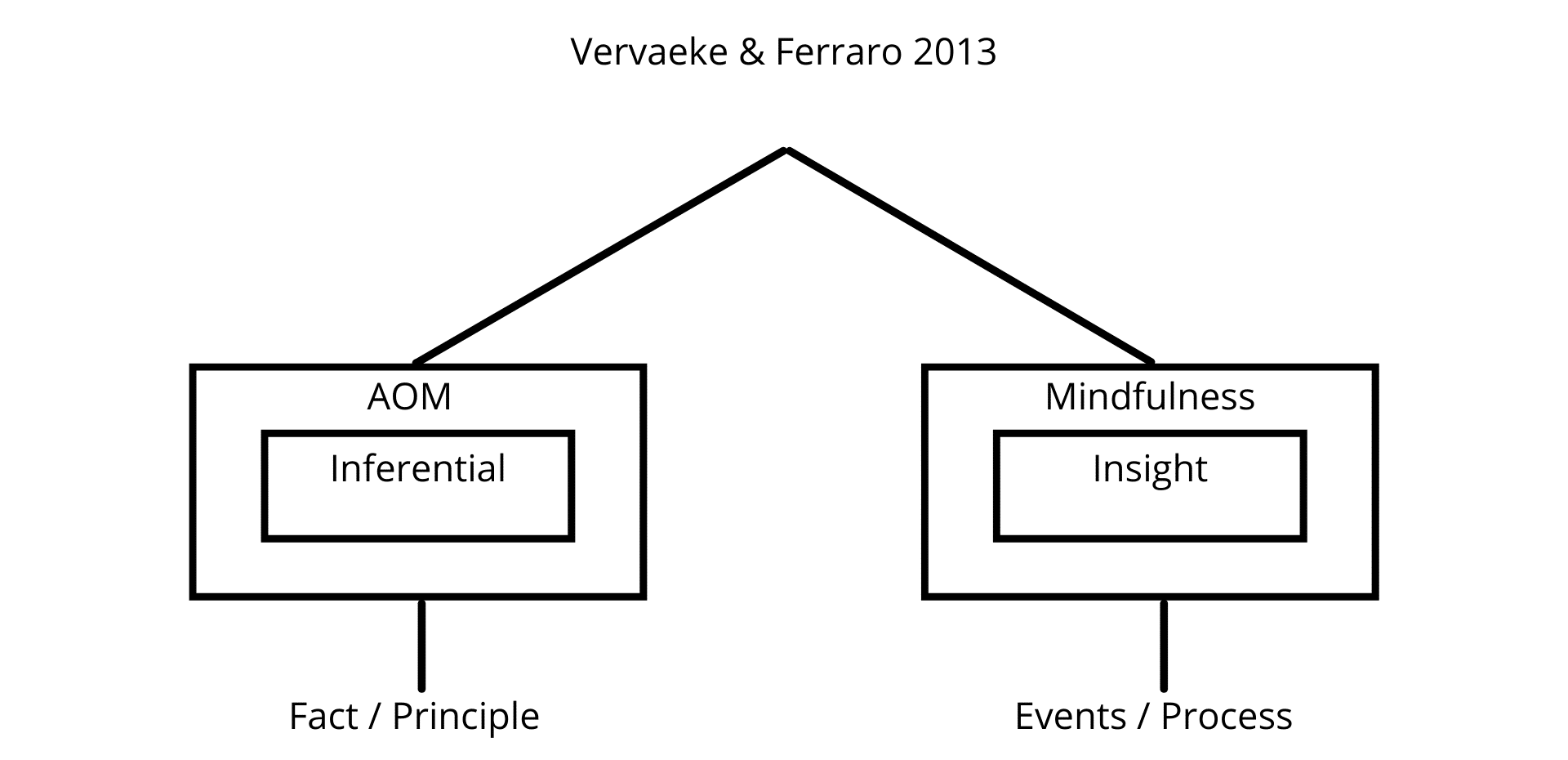
Fig. 1b
And this (indicates AOM and Inferential) would therefore largely be sort of like what's being talked about in sophia. And this (indicates Insight and Mindfulness) is largely what perhaps what was being talked about in phronesis. We suggested that—I'm still open to that suggestion. I'm not quite sure that it maps as cleanly as that now—but in addition to this clearly propositional and, at least, centrally procedural, we invoked perspectival (Fig. 1c) (draws a square and writes Perspectival inside). So this is propositional (writes Propositional beside AOM and Inferential). This is largely procedural (writes Procedural to beside Mindfulness and Insight). And then this is perspectival (indicates Perspectival at the top). And then so this has to do with inference, this has to do with insight and we've already got a good sense. We've seen this. We didn't—we were not aware cause it hadn't been generated. We were not aware of Grossman's work at the time, but we knew the Berlin work. And this is, of course, what's being managed here is internalization (writes Internalization below Perspectival). How do you learn to take, adopt and take other people's perspectives and internalize them within your own processing so they become metacognitively effective?
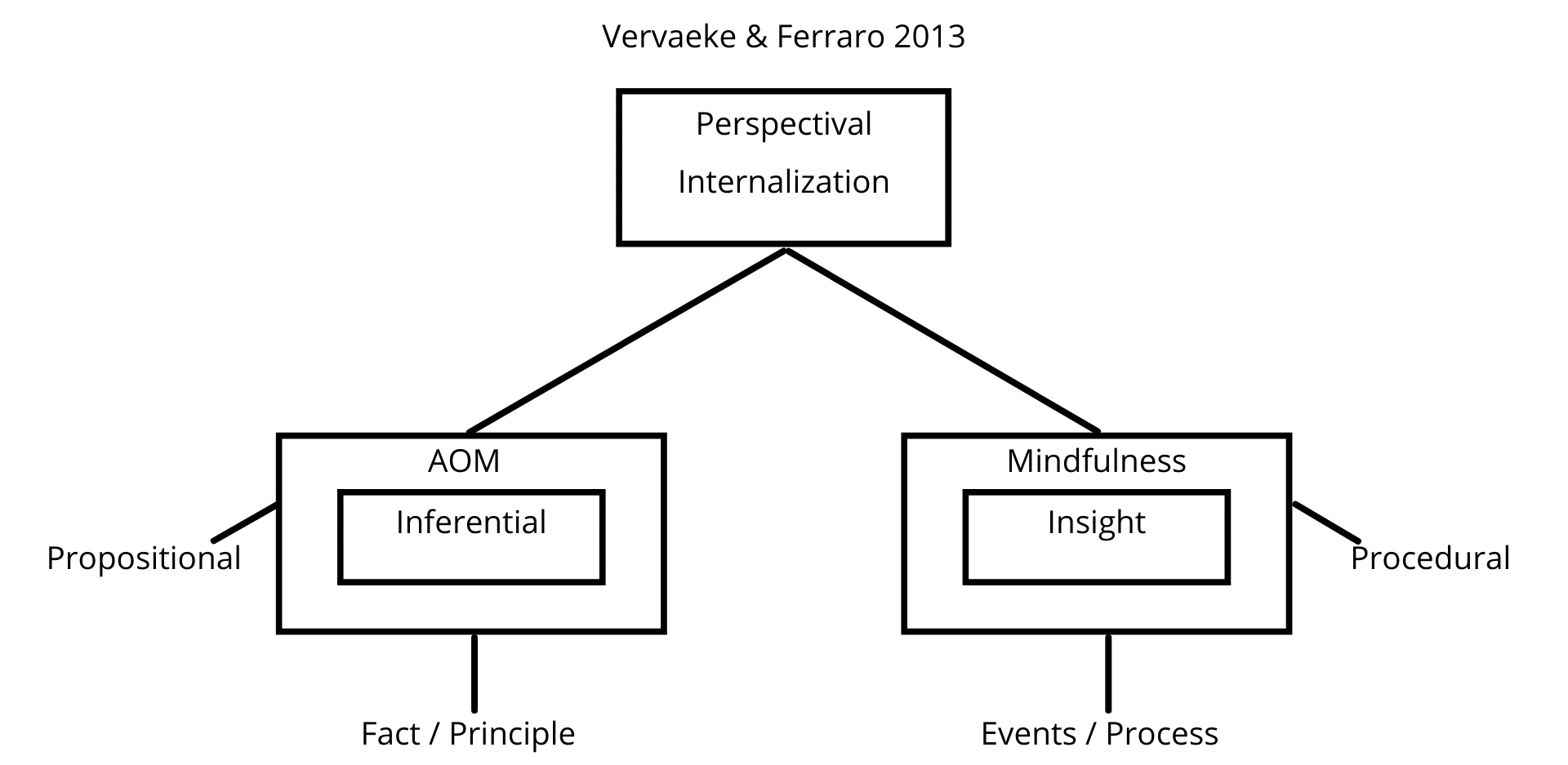
Fig. 1c
And then we said, well, what perspectival knowing did—and here's where I want to—one of my, I think first criticisms. We said, well, what perspectival knowing does is it integrates knowledge of facts with knowledge of events. It sort of helps you to use, I think, maybe better language, it helps you to put principles (indicates Fact / Principles) into process (indicates Events / Processes) and have processes (indicates Events / Processes) governed by principles (Fact / Principle). And that's what sort of perspectives are doing. So this (indicates Insight and Mindfulness) is—we're talking about the epitome of this is a skill and the epitome of this is a theory. And what a perspective does is put theories and skills together.
I think that's kind of right, still in a sense, but I think the relationship is—and this is what I would argue for here. The relationship is more like this. That propositional knowledge (Fig. 2) (writes Propositional knowledge) is grounded in but affected by (draws a double-headed arrow below Propositional knowledge) procedural knowledge (writes Procedural knowledge under Propositional knowledge), your skills, knowing how to interact. And then (draws a double-headed arrow under Procedural knowledge) that this (indicates Procedural knowledge), your ability to cultivate skills and then apply them to the propositional knowledge is grounded in your perspectival knowing (writes Perspectival knowing under Procedural knowledge). Because that's going to give you your situational awareness that you need to cultivate the skills and, so that you can apply (indicates Propositional knowledge) your knowledge of principles. And then I would argue that that's—and you've seen me make this argument before. This is ultimately grounded in your participatory knowing, (writes Participatory knowing under Perspectival knowing) the agent arena attunement that affords your being in the world and your ability to go through modal transformation, existential change.

Fig. 2
So that also brings up—I might as well mention it now, another criticism of this theory (indicates Fig. 1c), which is, although it's talking about propositional and procedural knowledge and perspectival knowing, there's no clear discussion here of participatory knowing (indicates Fig. 2). And that's a significant lacuna in the theory for the following reason. Without an account of participatory knowing, for all of its claims, the Vervaeke and Ferraro theory of being a process theory rather than a product theory, without talking about the participatory knowing, it really can't incorporate into its account of becoming wise how one goes through transformational experience, how one goes through modal change. I mean modal in the existential sense, not the logical sense. So without connecting participatory knowing to this overarching schema (indicates Fig. 1c), the connections between wisdom, transformative experience, altered state of consciousness—all of these things that we've discussed are actually crucially missing from this theory. And therefore it's claim to being an adequate processing theory can be rather significantly challenged. I think that, so that needs important development.
We did talk about a cognitive style that you could cultivate.
One more thing. I think what we were doing is also, we were smuggling in that the perspectival knowing (indicates Perspectival and Internalization) with the process of identity creation, that's central to participatory knowing (indicates Participatory knowing in Fig. 2). So I think that was also a part of the problem.
Sophrosyne As An Optimization Of Your Perspectival Knowing
Now, what we did argue is that this (draws a larger square around Perspectival and Internalization) is set within a cognitive style that will give you a higher order way of regulating active open-mindedness and mindfulness. And here we took directly from the philosophical tradition and we talked about internalizing the sage (Fig. 1d) (writes Internalizing the sage beside Perspectival and Internalization). Internalizing Socrates, internalizing the Buddha, internalizing Jesus, internalizing the sage.
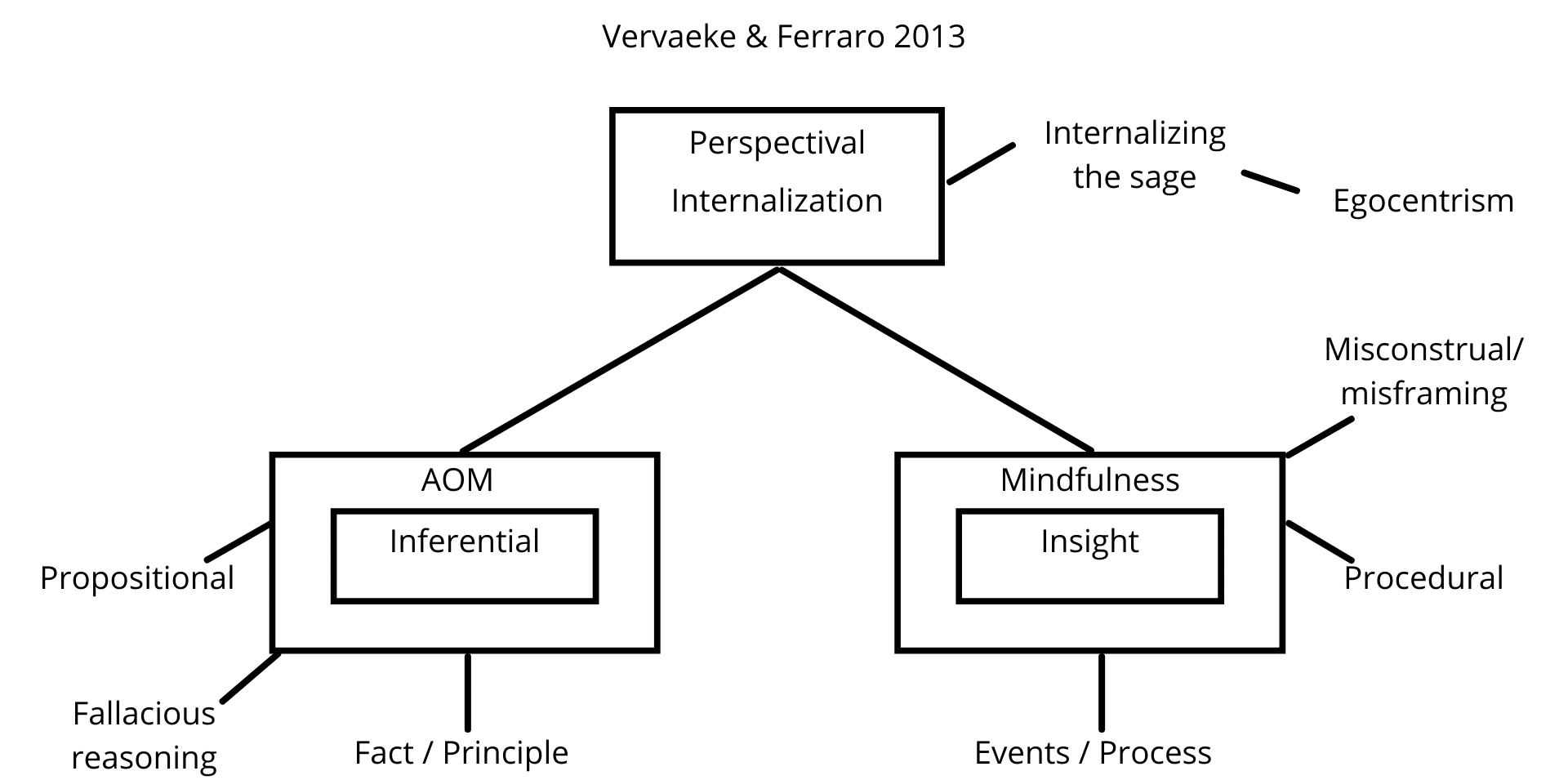
Fig. 1d
And we talked about what impact that has. So we, you know what this is. Internalized. We talked about this repeatedly. What the process of internalization is. What it's like to internalize Socrates, et cetera, et cetera. And we've already seen how central that is to wisdom. And see—so while this is overcoming fallacious reasoning (writes Fallacious reasoning beside AOM and Inferential), right? This is overcoming misframing, misconstrual (writes Misconstrual / Misframing beside Mindfulness and Insight). What this (indicates Perspectival and Internalization) is doing is it's helping you to overcome egocentrism in a powerful way (writes Egocentrism beside Internalizing the sage).
These are all ways in which we can fall into illusion, self-deception. But we also talked about what does internalizing the sage do? What's—when you get that metacognitive enhancement, you get that perspectival ability, what's it doing?
So here we talked about a virtue that you haven't heard me talk about very much (Fig. 1e) (draws an arrow from Perspectival and Internalization and writes Sophrosyne). And it's unfortunate because, in some ways, this is... Okay. So the ancient Greeks had four cardinal virtues. Wisdom, which is really kind of a meta-virtue. Justice, which we talked a lot about. Courage. And then the fourth is this word, Sophrosyne.
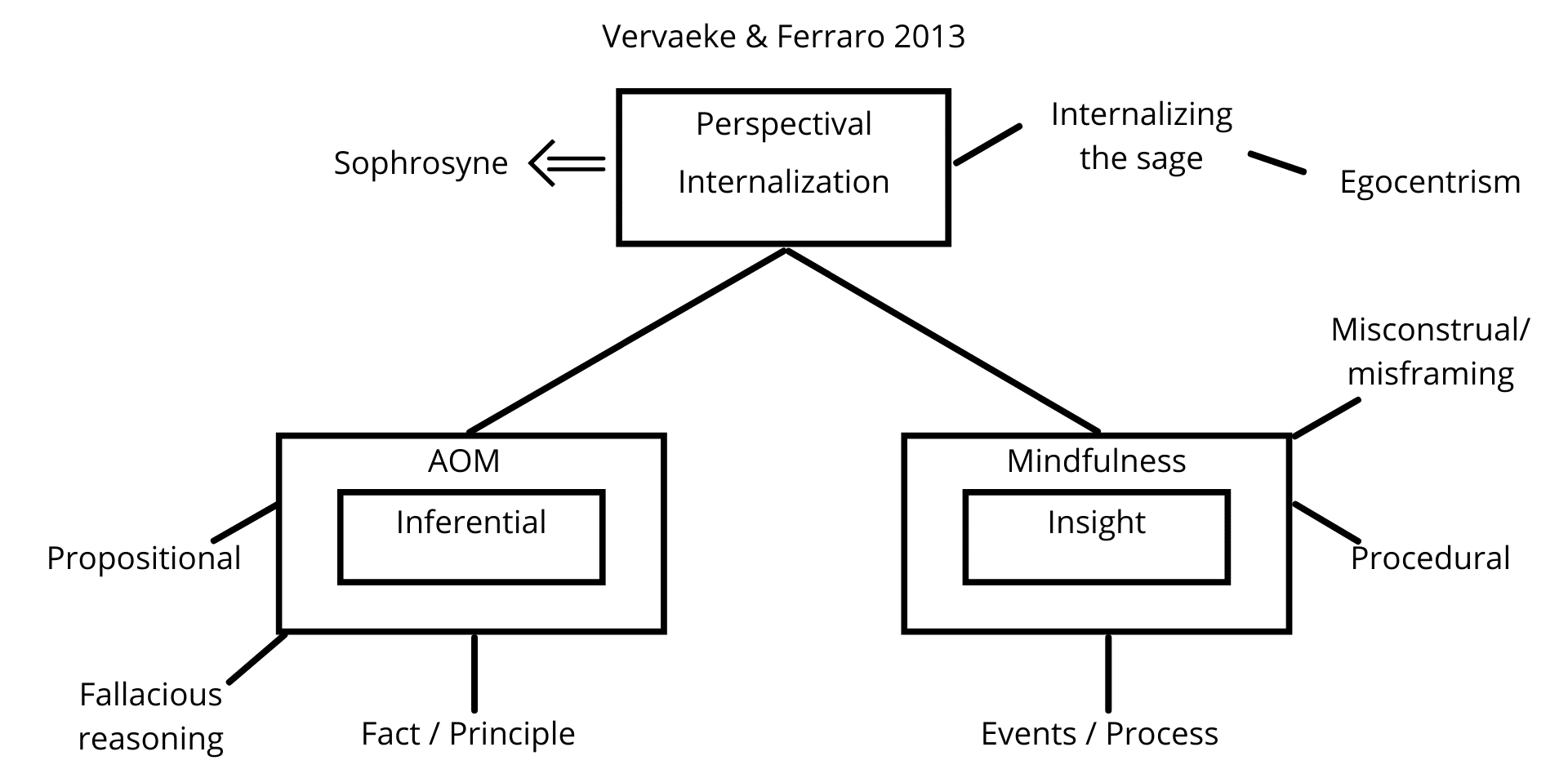
Fig. 1e
Now sophrosyne is often translated as temperance—doesn't capture it well. Moderation, doesn't capture it well. So I want to put aside that and try and come back at this. But you see, if you went to the Delphic Oracle, there were things inscribed on the wall there. And one was know thyself and that's clearly, you know, connected. Socrates made it his own. And we've come to know what that means. How the knowledge of oneself is, of course, not romantic autobiography, but a deep understanding of the principles by which you're operating.
But the other one was everything in moderation, which was like this. But that's not—again, moderation is good, but it's not quite right. And we know this (indicates Sophrosyne) is connected to something like Aristotle's notion of the golden mean. That all virtue—and remember what that is? You're trying to create a virtual engine that generates enough options, so you don't suffer vices of deficit, but also generates enough, there's enough governance. There's enough selective constraints so that it also thwarts vices of excess. So there's a kind of optimization going on there.
And as I said, there—you get a little bit in the word moderation, but moderation sounds more like averaging and settling. We argued that there's a better way of trying to understand this by understanding it as something that it was often constrasted with, which is enkratia (Fig. 1f) (writes Enkratia beside Sophrosyne). So, you know, this word (indicates Enkratia). This is demos kratia (writes Demos and Kratia above Enkratia). Power or rule by the people and kratia is sort of exercising power on yourself. So this is kind of like self-restraint, self-control (writes Self-restraint under Enkratia).
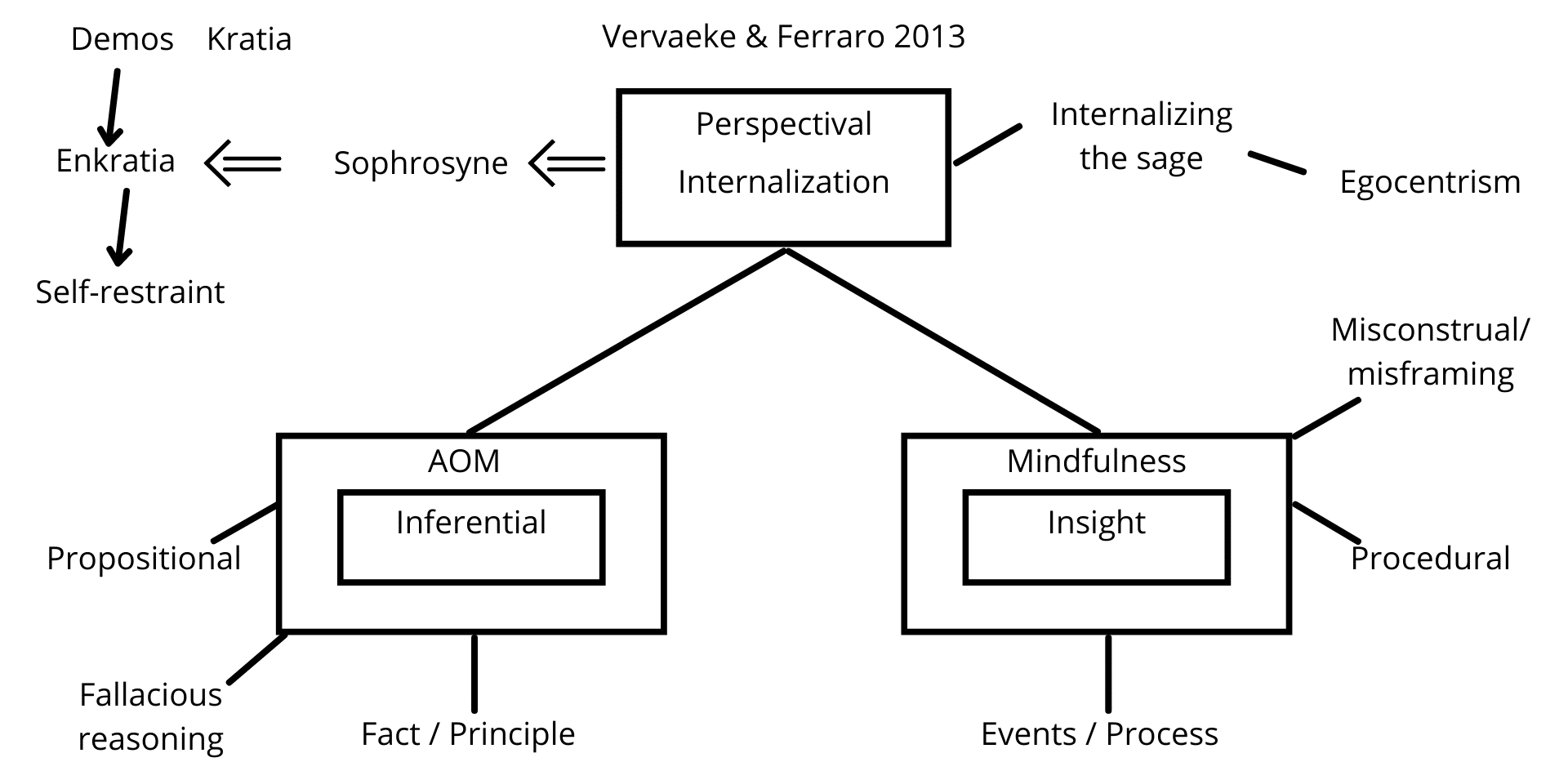
Fig. 1f
And so a way of getting at this is to think about the fact that you could be practicing a virtue—a virtue (indicates Enkratia) enkratically or in a sophrosynic manner. Let me give you an example.
So here's two people. There's Tom and there's Susan. Tom is honest, or at least he's trying to become honest. Now Tom goes into situations and Tom sees clearly the potential to lie. And he sees clearly the benefit that would accrue to him if he lies and it comes with a tremendous sort of temptation. There's a tremendous impulse. And so he exercises self-control. And he doesn't lie. And Tom is to be commended for that. That is an important kind of honesty.
But consider Susan. Susan comes into a situation. She clearly sees the opportunity to lie. She clearly sees the advantages that would accrue to her if she lies. But that's it. It's like when we talked about Frankfurt and whether or not something—it's unthinkable to her, not in the sense that she can't think the thought, I can lie. Or think or imagine to herself lying. It's not a viable option to her. She can't get into the existential mode where that draws on her in any way. So although she can think it in one sense in a Frankfurtian sense, it is unthinkable to her. It just—she's not tempted to lie in that sense.
Many of us, myself included would side with the Greeks in saying, Susan is more honest than Tom. Because honesty is now second nature to Susan in a way it isn't to Tom. So that's sophrosyne, at least one aspect of it.
Do you remember when we were doing Paul and agape? And Paul says, now I will show you the most excellent way. And then he's talking, of course, about agape as the most excellent way. And then he says, remember, in order to try and get you to understand the transformation, when I was a child, I thought like a child, I spoke like a child and acted like a child, but when I became a man, I put childish things behind me. And remember we talked about that? When you're a child, you're deeply tempted by toys, your salience landscape automatically organizes in a certain way. But when you're an adult, when I'm a man, I come in and I see Spencer's toys. I know that they're there. I know that I could play with them, but they have no pull on me. They do not call me. They do not tempt me. And as the child is to the adult, the adult is to the sage, the sage has a salience landscape in which they are not tempted to self-deception in the ways that we so readily are.
That's sophrosyne. It is to have a salience landscape (draws an arrow pointing towards Sophrosyne) that has gone through a kind of fundamental reversal. It is not—I mean, these are all differences of emphasis, but like the way our salience landscape is less oriented towards the self-deceptiveness of a child, the sage's salience landscape is less oriented towards our prevalent and pervasive forms of self-deception. They see through illusion and into reality.
So this (Sophrosyne) is, of course, deeply perspectival. And I want to add a little bit more to it (draws an arrow from Sophrosyne) because it's not just—sorry, you see this in Daoism, it comes through. The idea that once you've trained enough, you just have to, you just have to let—the sage can just let things unfold naturally.
You see this even in Augustine. You know, love God and then do what you want. Of course you have to love God. That means if you really, truly love God, if agape is flowing through you, as Paul recommends, then you have sophrosyne and then you will just, you will—and this is what I want to say. You will be tempted to the good. You will be tempted. Just like you could be tempted. Your salience landscape, naturally self-organizes towards self-deception. Your salience landscape, if you're wise, naturally self-organizes towards seeing through illusion, zeroing in on what's relevant and important and how it is relevant to the project of becoming more virtuous and having a more meaningful life. You're tempted, you're naturally tempted to the good. That sophrosyne. And so we argued that what you're doing here is you're cultiv—you're internalizing the sage and what that's doing is helping to overcome egocentrism in this deep sense of helping you to realize sophrosyne.
And so this means we argued that there's deep connections, and I don't think these have been explored enough between wisdom and sophrosyne. And of course sophrosyne is a kind of optimization of your perspectival knowing. It's that I've optimized my perspectival knowing. So it's always in service—and this (indicates Participatory knowing) is what was to some degree missing from this theory—it's in the service of my agent arena relationship and how that is being developed. Being developed. That reciprocal realization so that I can go through the important transformations that are needed to become a wise person.
We argued that what the sophrosyne is directed towards were three M's. Obviously morality (Fig. 1g) (writes Morality below Sophrosyne), more broadly construed as not just knowing the rules, but the capacity for being virtuous. Realizing meaning in life (writes Meaning in life below Morality). Now, a deficit there is we only had self-determination theory, Deci and Ryan on this kind of stuff. And much more work, much more significant work has been done with meaning in life. Work that I'm doing with Thalia Vrantsidis, Juensung Kim, Philip Rajewicz and we're presenting at APA this year. And so, this theory needs to be revised and I've tried to show you that in the course to more directly connect this machinery to meaning in life. So this needs significant improvement (draws an arrow to Meaning in life). We did argue that meaning in life is irreducible, Wolf, to morality. And then something we talked about is mastery (writes Mastery below Meaning in life).
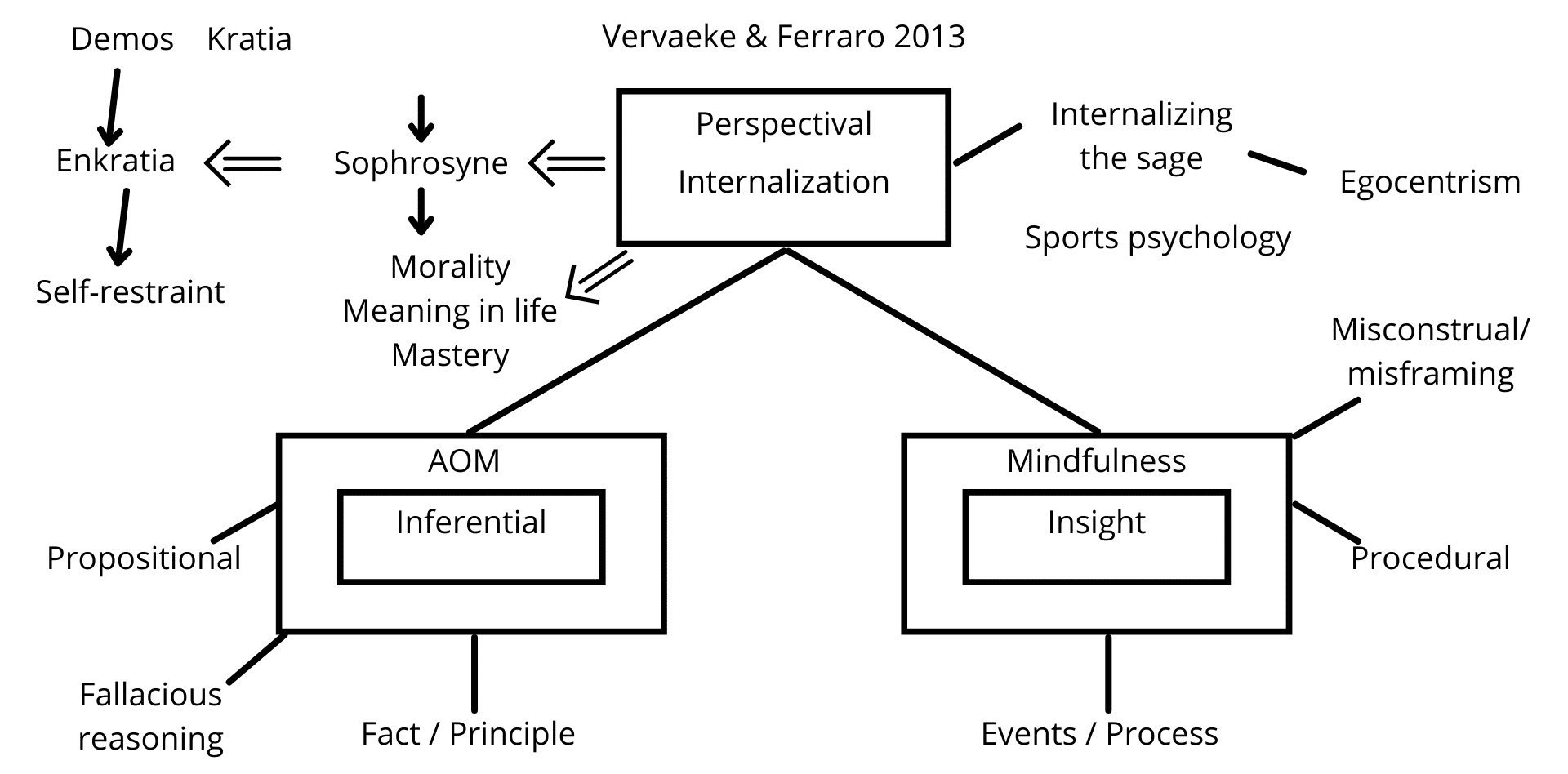
Fig. 1g
We use the three M's cause they're helpful. I'm not comfortable with that term anymore because of all of its political connotations. We were thinking of it more like in almost in the academic sense, like when you get your M.A. And then when, you know, in the oldest sense, like when you did your masterpiece. What we meant here was, you know, a terrific capacity for caring and coping with reality. You had sets of skills, you had sets of psychotechnologies, you had sets of roles that you could take.
So this gives you roles like propositional—sorry, propositional knowing (indicates Inferential and AOM) gives you rules. And procedural knowing gives you, you know, various routines. This perspectival knowing gives you various roles. And being able to use, you know, rules and routines and roles with mastery in coping and caring was central. Again, always guided under the governance, under the regulation of sophrosyne (draws an arrow from Sophrosyne to the three M's). So I've already—I mean, so this is a processing account. It tells you how to become wise. You cultivate active open-mindedness. You cultivate mindfulness. You cultivate internalizing the sage.
We use sports psychology (writes Sports psychology below Internalizing the sage) here as a way of trying to get what that (indicates Internalizing the sage) looks like. We also use, of course, developmental psychology Vygotsky, but sports psychology talks about very much how people go through a process of internalizing the coach and that's strongly analogous to internalizing the sage. And so we talked about—you cultivate active open-mindedness. You cultivate mindfulness. You cultivate internalizing the sage. And you're guided overall by trying to become sophrosynic in that.
And so this is a processing theory, as I've mentioned, I think there's a deficit in it. It does not take into account—it's—what's absent from it is transformational experience, transformational development. These are all very telling things. The role or relationship between this and altered states of consciousness was not properly developed. The participatory knowing, which of course connects to the transformational experience is missing. So wisdom is not connected to gnosis here in any important way.
So those are some important criticisms I would have. The relationship between the kinds of knowing wasn't well-developed. We sort of just argued that while perspectival knowing sort of synthesizes these (indicates AOM and Inferential and Mindfulness and Insight) together, I think that's too simplistic. A much more complex relationship, you see me argue for in this course, I think needs to, it is being developed and needs to be developed.
Two things that were strongly implicit in other p—Oh, I should mention. A core aspect of this theory that I think is still central is that all of this, all of this (indicates the whole board), and we made this very explicit, all of this is, and this came out. I was so part of this conversation that I forgot to take a moment and explicate it. That all of this is about enhancing relevance realization (indicates Fig 1g).
Our main argument is that wisdom is some kind of comprehensive optimization of cognition. And then I would extend that now. Consciousness, character, et cetera, and that in order to optimize cognition in a comprehensive fashion and in the developmental fashion, that means that what you're doing is enhancing relevance realization. And we always, we already saw that at work throughout this. And we saw that relevance realization is central in the explicit psychological theories that we've already examined.
Now in connection with that, there's another serious lacuna in this theory, which is that, although it does something, I think that's very important, it connects wisdom to insight. Let's start here (indicates Insight). I mean, it will be odd to say, you know, Sam is very wise, but he's not very insightful. That seems wrong. We could say things like, you know, Sam is very wise and he's maybe not very educated. He might not be sort of super intelligent. That's fine, right? But to say that Sam is wise and not insightful, well, that seems to trespass on that McKee and Barber point about seeing through illusion. Wisdom definitely has to do with, you know, gaining knowledge in the best way, theoretical knowledge. Obviously gaining procedural knowledge.
So the wise person knows how to believe well, and that seems also deeply, deeply right. The wise person is overcoming egocentrism, internalizing the sage. The traditions point to this very clearly. And they point towards sophrosyne, the most excellent way. And of course, one way in which this—we could understand this (Sophrosyne) is exactly the Pauline recommendation (Fig. 1h) (writes Agape). That the best form of sophrosyne is agape. So, but what's missing?
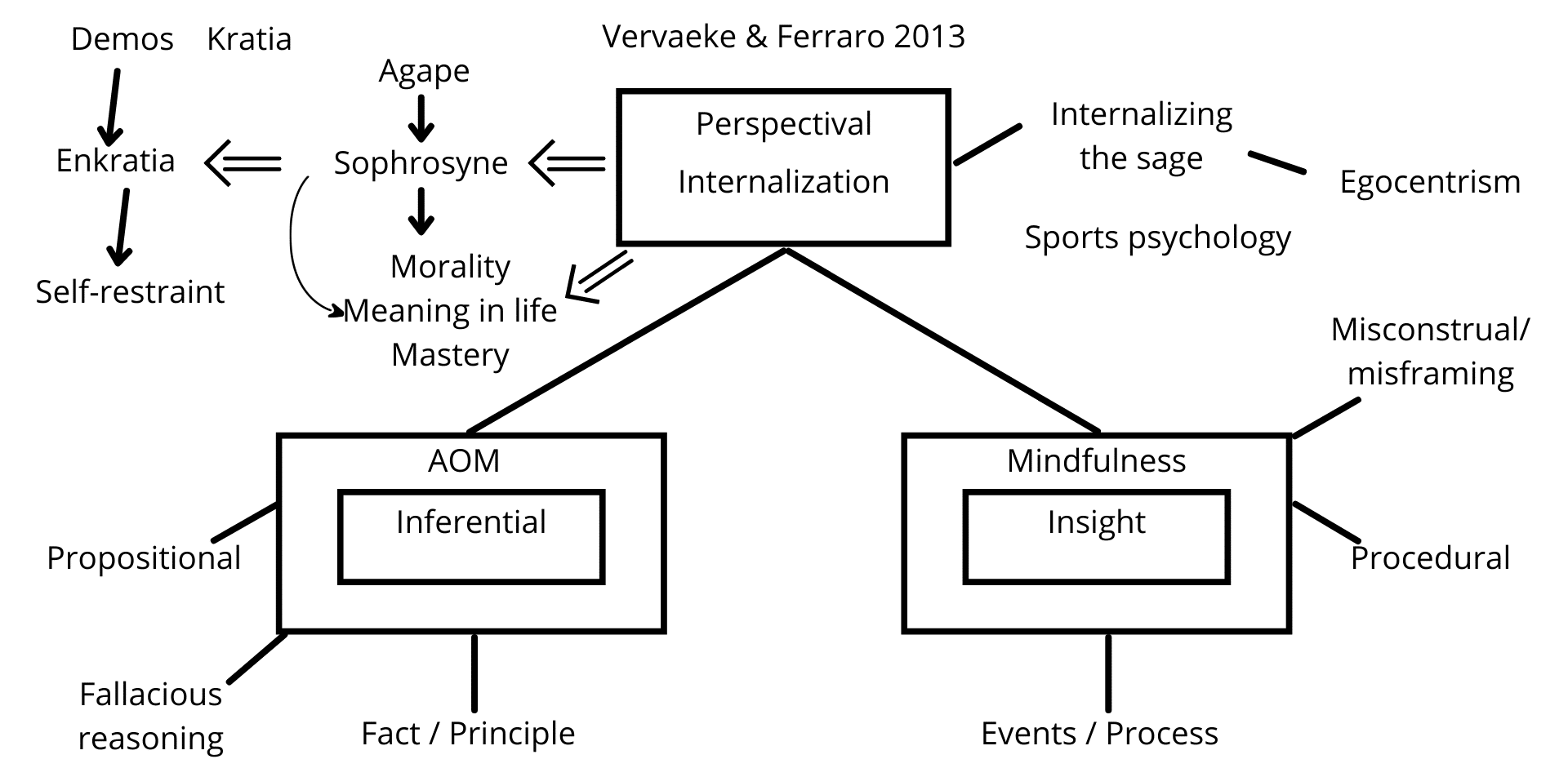
Fig. 1h
So I've already pointed many things, but something that's central here is a theory of understanding. To say that, you know, like, oh, Bill is very wise. He's so insightful. He's, you know, he's so capable of self-transcendence and overcoming egocentrism. He believes things really well. Like he's not easily duped, but he doesn't understand. He doesn't have deep profound understanding of things. It's like, no, no, that's not right. One of the ways people zero in on relevant information is by being more insightful. Yes. One of the ways they zero in on a relevant information is like avoiding bias and fallacy in their inferential changes of their beliefs, right? One way in which they zero in on relevant information and overcome egocentrism is all of the perspectival, internalization, the cultivation of sophrosyne.
But what's missing—and we saw this in Ardelt's work very clearly, we saw it implied in Sternberg's. And so we should have taken this into account. Wisdom should also have within it a clear theory or connected to a clear theory of understanding. And so I think that's also missing. What is it to enhance understanding? What is it to develop a profound understanding?
So I want to try and at least discuss that. I'm not in the place where I have a complete theory of understanding. I've been doing a lot of work on it. Work that I'm actually doing with Leo Ferraro. And because that theory is still very much a work in progress, I'm also not clear quite how it would fit into this (indicates Perspectival Internalization). What would be the cognitive style for tapping into the participatory knowing and how does that relate to enhanced understanding? I'm not sure. I don't know. I don't know. So the criticisms have shown me many ways in which there's important lacuna, there's things that are underdeveloped and things of which I'm ignorant.
However, and I'm going to try and address the understanding issue in a moment. I would like to say, nevertheless, we can see how all of the theories converge, including this one on relevance realization, intelligence, rationality, these different kinds of knowing, and integrating them together, optimization. They're all zeroing in on this, so that we see—remember? Back to this old diagram, everything converging (Fig. 3) (draws converging lines) on the RR (writes RR) and then coming out (draws diverging lines) into all these aspects of human spirituality. And here's one (writes Wisdom) I've made, I think, a plausible case for that really helps plays a crucial role in helping us to give a naturalistic account of what wisdom is. That I think I've made a plausible case for. Now, what about understanding?

Fig. 3
Well, we already saw it invoked with this grasping of significance (erases the board). And it's interesting in a completely independent and convergent manner. When you look through a lot of the current philosophy of understanding, this is what people are now distinguishing understanding from knowledge, distinguishing understanding from just possessing an explanation, because an explanation is a set of propositions. So there is the idea that understanding is something beyond possessing an explanation. It's something above and beyond simply knowing. We already saw with Kekes, this idea of grasping the significance. And I pointed out to you that that could be understood in terms of construal and relevance realization. What I am saying is if you take a look at the philosophy of understanding literature, this idea that understanding goes beyond knowledge and explanation in the grasping of the significance of the knowledge is something to which you can make—you can draw a quite powerful convergence argument. Many people are converging on this idea.
There's some variation on what they think this grasping the significance is. I think, to go back to Smedslund that it has to do, like we saw with grasping the relevance of what you know. Remember that was one of the key features of his account of understanding. So in addition to all the implication, relations and logical relations, there were relations of relevance, non propositional. And then I argued that construal plays a central role and that construal can be understood in terms of problem formulation, the relevance realization machinery that's found within problem formulation.
Good Construal
So I would argue that what we're talking about is a really good construal (Fig. 4a) (draws a square and writes construal inside). And we have a way of talking about that already. We have the notion of an optimal grip (draws a downward arrow from Good construal and writes Optimal grip). I have a really good construal [that] has a structural functional organization. I've sized up the situation. You know, featural Gestalt, the right degree of transparency opacity. I'm getting an optimization on my grip on things. So this is good contact. That's the good construal. And then what it does is it affords me to grasp what's relevant in this situation. How I sized up the situation and got an optimal grip on it, affords—remember in Madison—good problem formulation?

Fig. 4a
Now, we also saw something else. If you remember the connection to good problem finding (Fig. 4b) (draws arrows pointing from Good construal). And that's why I talked about the problem nexus. And I promise to come back. I talked about Arlin. But I also mentioned that point, the work of—very recent work—all my markers are running out—of de Regt (writes De Regt). And I've never met this person, so I hope I get their name right. I just want to copy this very carefully (writes Cigsberg). Cigsberg? I'm not sure if that's right or not. This is work from 2017 (writes 2017). And then there's also de Regt's own book on understanding. And there's a lot of good work going on about this. It's very exciting stuff. They point towards what they call the standard of effectiveness for understanding. I understand something—what's the contrast here?

Fig. 4b
Standard Of Effectiveness For Understanding
Okay. You don't want to say that somebody has understood something. And what that means is they've grasped the truth. Now they have to be trying to grasp the truth. That's important, but—and that'll come out in a moment, right? But you can't say, well, if they didn't grasp the truth, they don't understand because then you're your faced to say the following thing that, you know, most people have never understood anything because most people's beliefs in the past are faults. And most of my beliefs right now are false. So I'm actually not understanding. You don't want to tie understanding too tightly to truth in that fashion.
So instead of tying it to truth, you might want to tie it more to something like rationality, where you're trying—you're using the best methods for trying to get out the truth. That's more plausible. And this would also help to explain why in the prototypical instances within science, we use things that aren't true in order to generate understanding. You go and you open a science textbook and they'll show the atom with this little circle and things going around it (Fig. 5) (draws a circle and larger rings around it), right? And that's all, that's pretty much completely false. It doesn't matter that it's false.

Fig. 5
It is effective for helping you to grasp the significance of the scientific model of the atom to draw, as Cherniak would say, the right implications, look for the right connections. It helps you zero in on the relevant information in the right way. And that's why it's used. Nobody—you're making a mistake if you think most of the diagrams and the idealizations that are at work in science are attempts to represent the truth accurately. They are not, they are attempts to effectively get you to zero in on the relevant implications. Make the relevant connections as Smedslund would say. This is what is meant by effectiveness.
Effectiveness is exactly doing. And then they talk about how, what it is to say that somebody understands something, is that they're good at being able to apply their knowledge, find new domains, open up new areas of research. So of course, it's this multi apt ability to apply what their good problem formulation here. To transfer it and transform it and specify in many different ways. And what's implied in here, of course is an important capacity for problem finding (Fig. 4c) (writes Problem finding). Somebody who has good understanding can facilitate a need for—they can motivate and facilitate a need for cognition because they can use that to go out and find and formulate problems, perhaps zero in on important problem nexus.

Fig. 4c
So, and, of course, this optimal grip is giving me something that De Regt—I don't know how he pronounces his name, also talks about what many people talk about. The idea that understanding is contextually sensitive. It's contextually relative. To know that I understand something is relative to the situation at hand and relative to the person at hand.
You and I can both know the same things, but if you're in situation A and situation B, you might understand those things because you can apply them in A. I don't—I couldn't be said to understand them as well, because I can't apply them in situation B. Also, we could be in the same situation, but I have a different set of skills. And so I can apply my knowledge better than you can. I understand better than you can.
So there's very much that this is context relative, and I would then add, of course, context sensitive (Fig. 4d) (writes Context relative and Context sensitive below Optimal grip). And that, of course, is the context sensitivity, whereas this is the ability to do things in a much more context general way. And of course, I'm invoking the machinery of relevance realization. I'm invoking it in a good construal and then the ability to transfer it insightfully (indicates Problem finding).
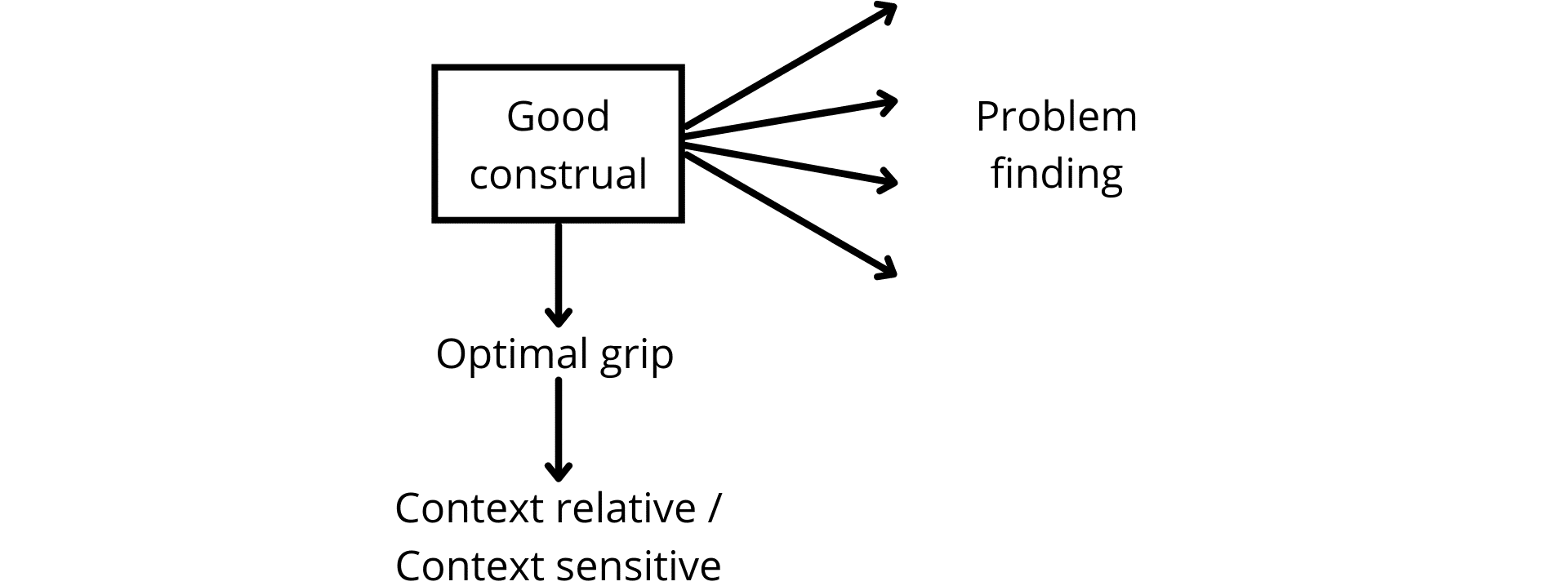
Fig. 4d
I would also argue that one more thing is needed. Because we've already got the idea that when if I am making these kinds of forward commitments, cognitive commitments, they need to be backed by a lot of convergence (Fig. 4e) (draws arrows converging on Good construal) so that my construct is also trustworthy. I've done a lot, and of course, to overcome self-deception. So if basic understanding is to grasp the significance, grasp through relevance realization, the relevant implication, the relevant connections—this is what I'm trying to suggest to you. That basic understanding becomes profound understanding when basic understanding is used to generate plausibility (writes Generate plausibility above Good construal).
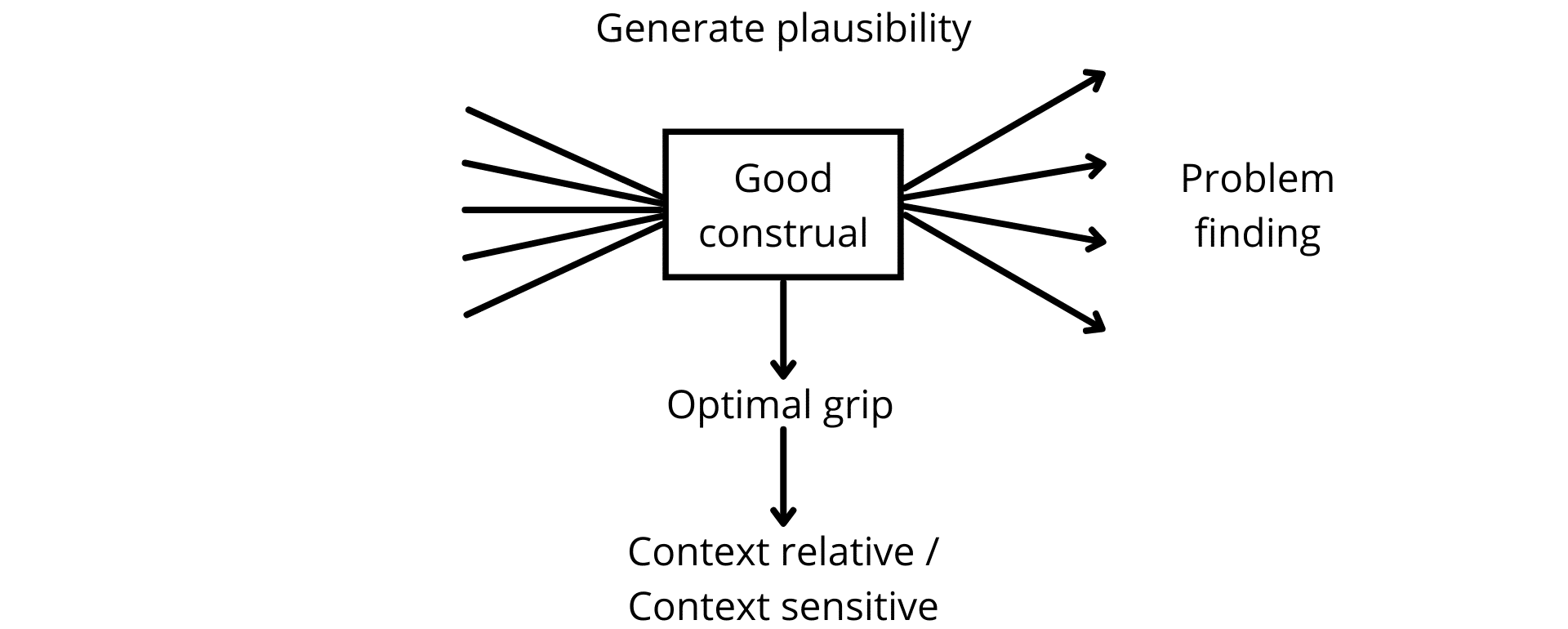
Fig. 4e
I don't think that's enough because if you'll allow me a sort of schematic way of putting it, this is very horizontal (draws a horizontal arrow) it tells you how to bring different domains together into your good construal and then apply them to many domains. And you're doing the compression. And then you're doing the variation. You're doing the relevance realizing. The compression, variation, good problem formulation, optimal gripping. This is contextually sensitive (indicates Context sensitive). This is effectively applied across in a cross-contextual manner, et cetera, et cetera.
But I think understanding also has, if you'll allow me a vertical domain (Fig. 6) (draws a vertical line down the horizontal arrow), because I think part also of what profound understanding does, is it aligns and optimizes the relationship—so if this is plausibility generation (writes Plausibility generation in the X-axis), what's being aligned and optimized here? I think are the propositional knowing (writes Propositional in the upper right quadrant), the procedural, perspectival and the participatory (writes Procedural, Perspectival, Participatory in the lower right quadrant).
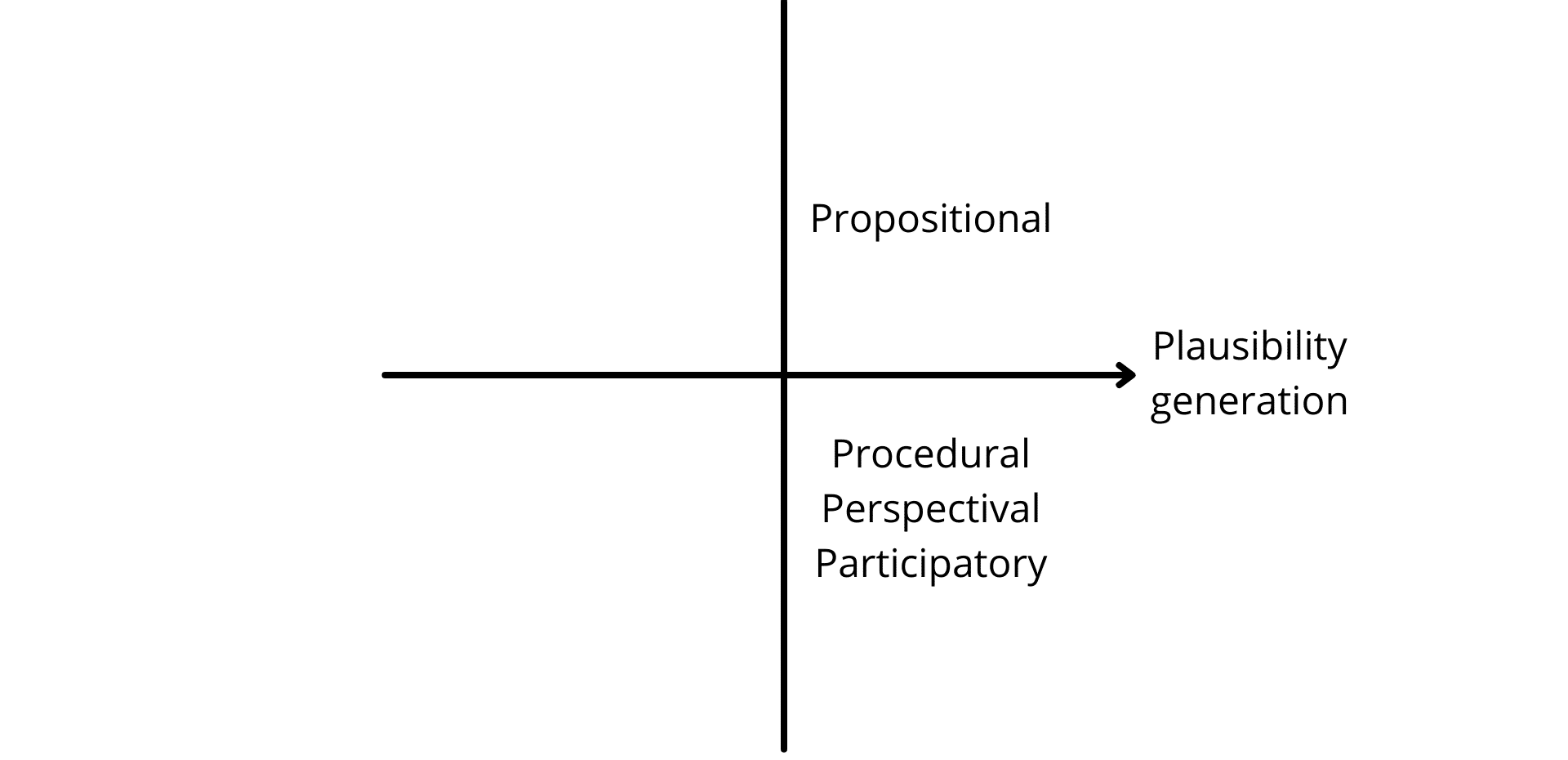
Fig. 6
I mean, this goes back. Somebody who really knew physics wouldn't just be grasping the propositions of physics, they would be able to—they'd have the skills. They'd know how to do physics and they'd have the situational awareness. They would know, you know, which skills to apply and which skills to develop in order to do physics well, There might even be a participatory aspect where they might have come to identify with the physicalist worldview and taken up their agency with respect to that. Although that might be problematic given arguments from the meaning crisis. But the more there's—so the more deeply these are aligned and interconnected and mutually facilitating each other the more capable they are, I would say, of understanding the material.
So I think what needs to be developed is a way of theoretically integrating the horizontal that understanding is to generate—well, at least profound understanding is to take basic understanding, grasping the relevance connections and make those relevance connections, convergence and elegance, optimal gripping. So that profound understanding is to generate plausibility. That's the horizontal. But profound understanding is also to align, so you're getting grounding downward and you're getting emergence upward, the relationship between propositional knowing, procedural knowing, perspectival knowing, and participatory knowing. And then all of that needs to be, of course, integrated into an account of wisdom.
As I said, what also needs to be aligned is transformational experience. And that means an account of gnosis needs to also be integrated into the account of wisdom.
Transformative Knowing / Experience
So (erases the board) that notion of transformative—of transformation, of knowing through transformation and becoming, so that knowing and becoming, knowing oneself and knowing the world and becoming a different agent in a different arena bound together. We've talked about this, that transformative knowing (writes Transformative knowing/experience), that transformative experience.
There's, of course, many instances in which it's rather sudden or somewhat sudden (Fig. 7a) (writes Sudden below Transformative knowing/experience), and so it has very much important features of insight and we've taken a look at that. And that, of course, is again, to recommend it one more time, the seminal and powerful work of LA Paul (writes Insight and LA Paul below Sudden).
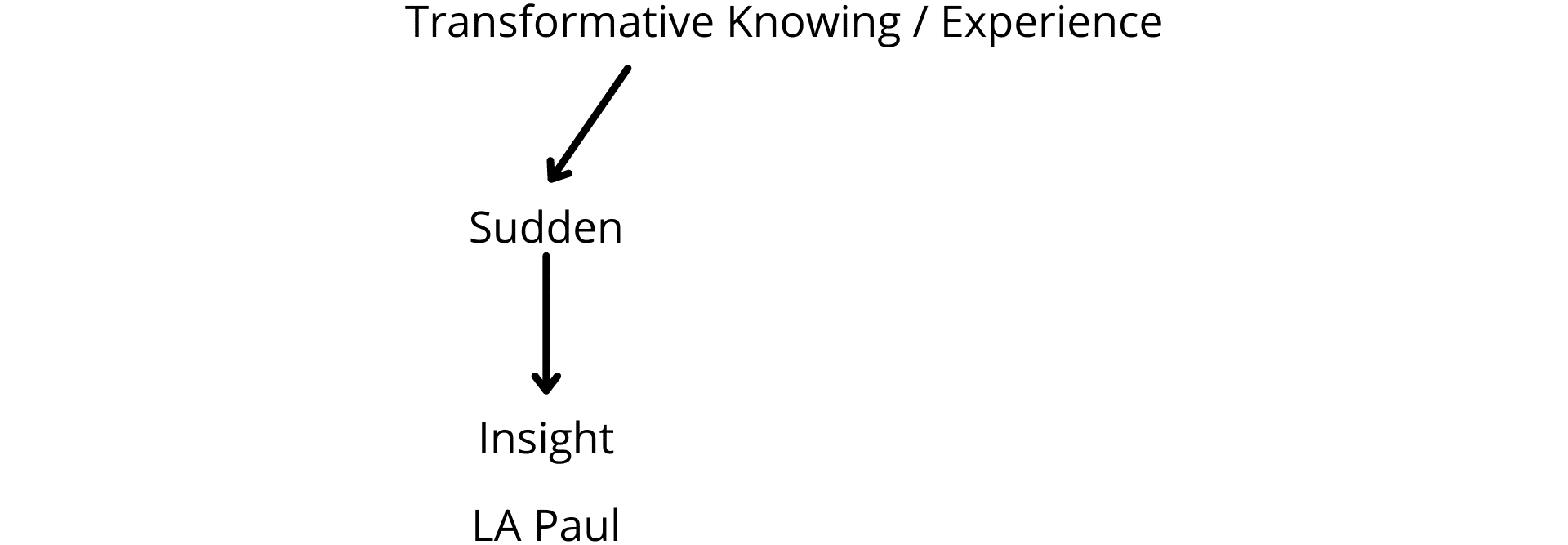
Fig. 7a
Now, Agnes Callard in her book Aspiration has, I believe it's 2016, has recently argued that there are also instances where people go through this transformative knowing that are much more incremental in nature (Fig. 7b) (writes Incremental nature under Transformative knowing/experience). She doesn't deny this (indicates Sudden), but she argues that there are very many instances about this (indicates Incremental nature). So all of the stuff we talked about here (indicates Sudden) hasn't been dispensed with. This (indicates Incremental nature) is being added as a compliment and a supplement.
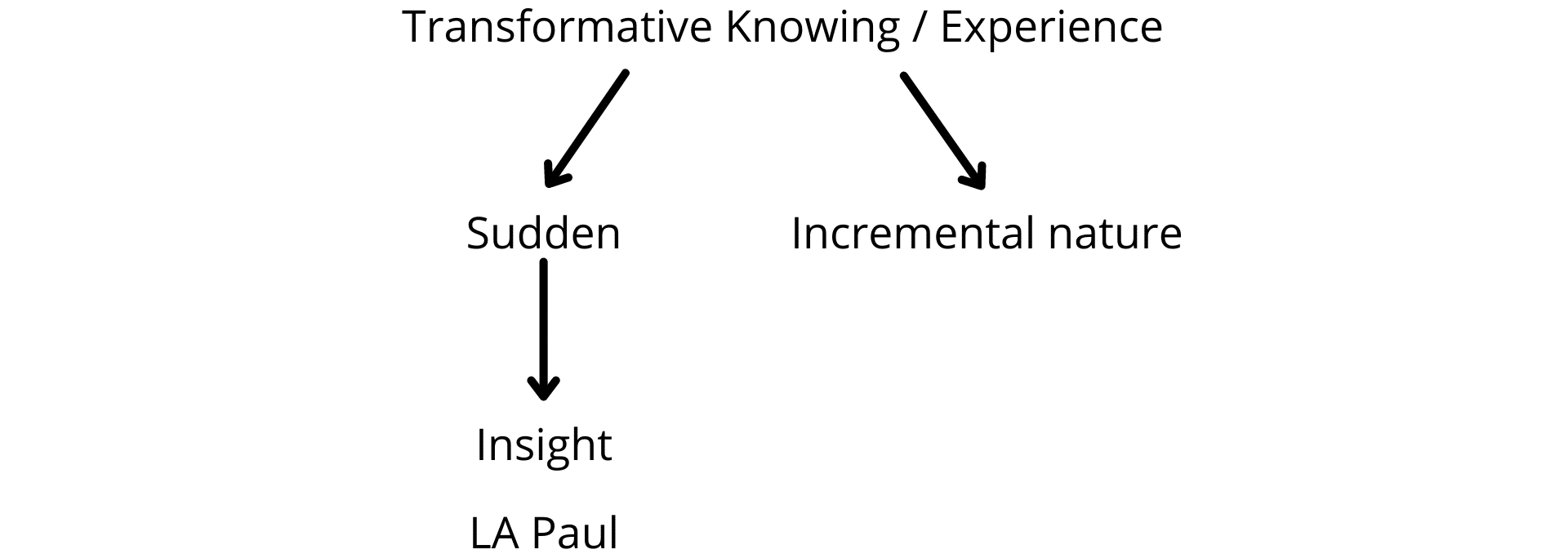
Fig. 7b
Aspiring To Proleptic Rationality
So what's an example of this more incremental process? She gives many examples. Let's use one. You joined a music appreciation class. Okay. And so we're using the word appreciation here, not in the sense of gratitude, but how it's used when people talk about music appreciation, art appreciation. So you're joining music appreciation class. What would make you a good student in the music appreciation class? If you're there because you want to impress your girlfriend or your boyfriend, or you're there because every time you go, you pass the chocolate store and you buy some chocolate. Or you're there because you're just trying to get a credit. The person teaching the music appreciation is not going to regard you as a good student, because why? Because the goal of music appreciation is to come to value music for its own sake. It's to come to finding music intrinsically valuable and therefore something that is directly relevant to your meaning in life. Something that you directly care about.
Now the thing is. If you were a good—now think of the paradox here, and this is so beautiful the way Callard brings it up. If I was a good student, I would appreciate music for its own sake. But if I appreciated music for its own sake, I do not need to take the music appreciation class. Do you see the paradox here? And then Callard points that this was the same thing when you decide you're going to undertake a liberal education. The liberal education is gonna give you values and preferences that you don't currently have.
So the idea is the music appreciation. So what do you do there? How do you break through that dilemma? Now, let's be very clear. Callard is in agreement with LA Paul, that you can't get through this in an inferential fashion for all of the arguments we've already seen. Right. She talks about—she does make something clear that I don't think that's clear in Paul's work.
She talks about the fact that this process, this process of trying to acquire an appreciation for something as intrinsically valuable. She calls this process aspiration (Fig. 7c) (writes Aspiration). Where you might call this process more inspiration (indicates Sudden), the sudden insight, right? Inspiration versus aspiration. So you're aspiring.
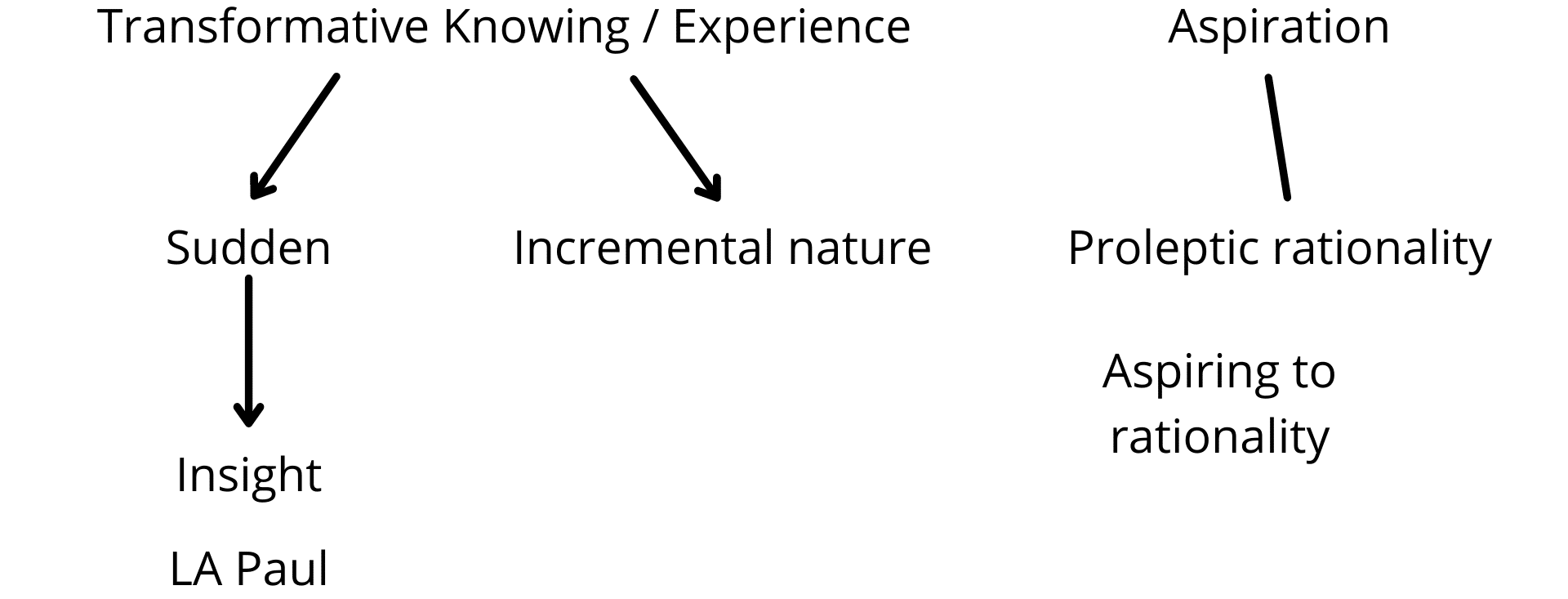
Fig. 7c
And she points out something that I think is really clear that this has to be something that can be seen as a rational process. Now, of course, there's ways in which we can screw this up. But what she wants to argue is that there's a form of rationality appropriate to aspiration. She calls it proleptic rationality. Like when you gave, when you were doing proleptic things in the ancient world, you were trying to encourage people to cultivate particular virtues or values. Proleptic rationality (writes Proleptic rationality under Aspiration).
Why? Because if we were to say that the person who is engaged in aspiration, who is trying to become somebody other than they are to go through the transformative experience, to have a perspectival knowing, a participatory knowing that they do not currently have, if we were to say—because they cannot do that inferentially. They cannot use decision theory to do that.
If we were to say, oh, therefore they're irrational. Notice the paradox we fall into. Because we would have to, we would have to conclude this, that if I am aspiring to rationality (writes Aspiring to rationality), because you have to, that would be an irrational thing to do. If I'm aspiring to virtue, that would be an irrational thing to do. If I decide to take up a liberal education to become a better person, a different better person, then that would be an irrational thing to do. On pain of kind of a not a propositional contradiction, but a performative contradiction—remember we talked about performative contradiction? This—to call that irrational would be a performative contradiction. My aspiring to rationality has to be itself a kind of rationality. That's proleptic rationality, or to use something older. My loving of wisdom. My loving of wisdom. My aspiring to becoming wise cannot itself be an irrational process. It has to be rational, not inferential rational, for sure.
So first of all, she does that excellent work of saying, look, this is we've got to broaden our notion of rationality to include aspiration. I would argue we have to broaden our notion of rationality to include inspiration as well. And that's the way in which I'm being radically sort of reconstructive of romanticism. So now the issue becomes what's going on here. Well, I'm going through a process of identity change (Fig. 7d) (writes Identity change below Incremental nature), transformative experience, participatory knowing, right.
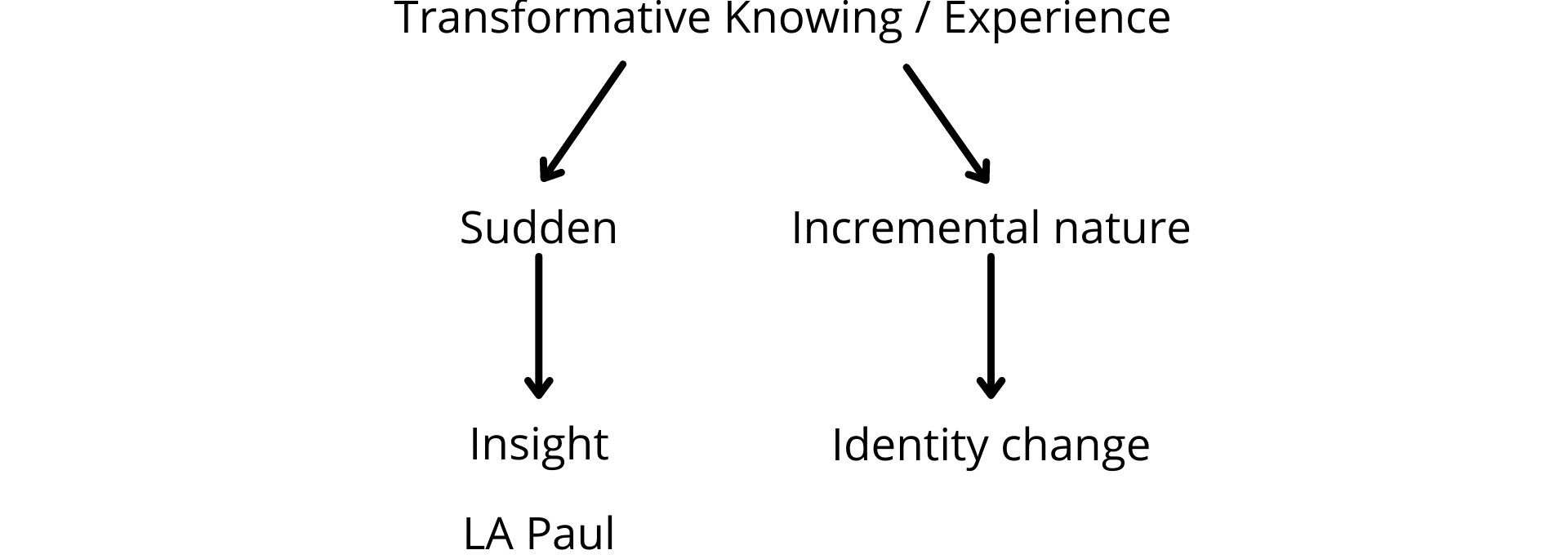
Fig. 7d
And here's where Callard's work is a little bit lacking. Because while she makes a very good case for aspiration, and a very good case for the nature of aspiration that it's proleptically rational, she doesn't give us very much towards a psychology of aspiration. And that's, of course, perhaps because she's a philosopher, she does offer a couple of cues.
Let's go back to the music appreciation. So I want to be, I want to—and think about how this connects to sophrosyne trying to tempt yourself into the good, but you got to do it in this tricky way and think about also how it's related to gnosis and trying to get out of existential entrapment. So what I got to do is I've got to give myself, I got to have a value that will get me currently engaged.
Here's my frame now. It'll get me currently engaged with music (Fig. 8) (draws 2 intersecting squares), but I will be able to give up that value (draws a northeast arrow from the center of the lower square) when I actually value music for its own sake. So you see what's going on here? You need to, she calls it a placeholder, but it's actually in our sense, it's a symbol. It's something that connects the future you and its way of life or your way of life to the current you. And it does it by having this double-faced—not duplicitous, cause you're aware of this. That's what makes it a rational process. This double-faced thing.

Fig. 8
So I may go to the music class because I currently have the value of sort of making myself do things that I find difficult. Now that's not the same value as appreciating music. But I do that with the understanding that that is temporary. That is to try and get me into a liminal place where I can start to play with what it's like to value music for its own sake. To enter that world. You can see the connections to gnosis here. You can see the connections to symbolic enactment here. Aspiration is deeply bound up, I would argue, with gnosis.
And then something that Callard, doesn't talk at all about, but we've already talked about. I think aspiration is deeply connected to wonder (Fig. 7e) (writes Wonder). Wonder gets you to question almost like Socratic aporia your world view, your sense of self. It opens up and it motivates you. It opens you up and motivates you to go through aspirational change. I think if you have a wonderful kind of gnosis that's got the appropriate placeholder in place, that's the beginnings of a psychological account of how we can go through aspiration.
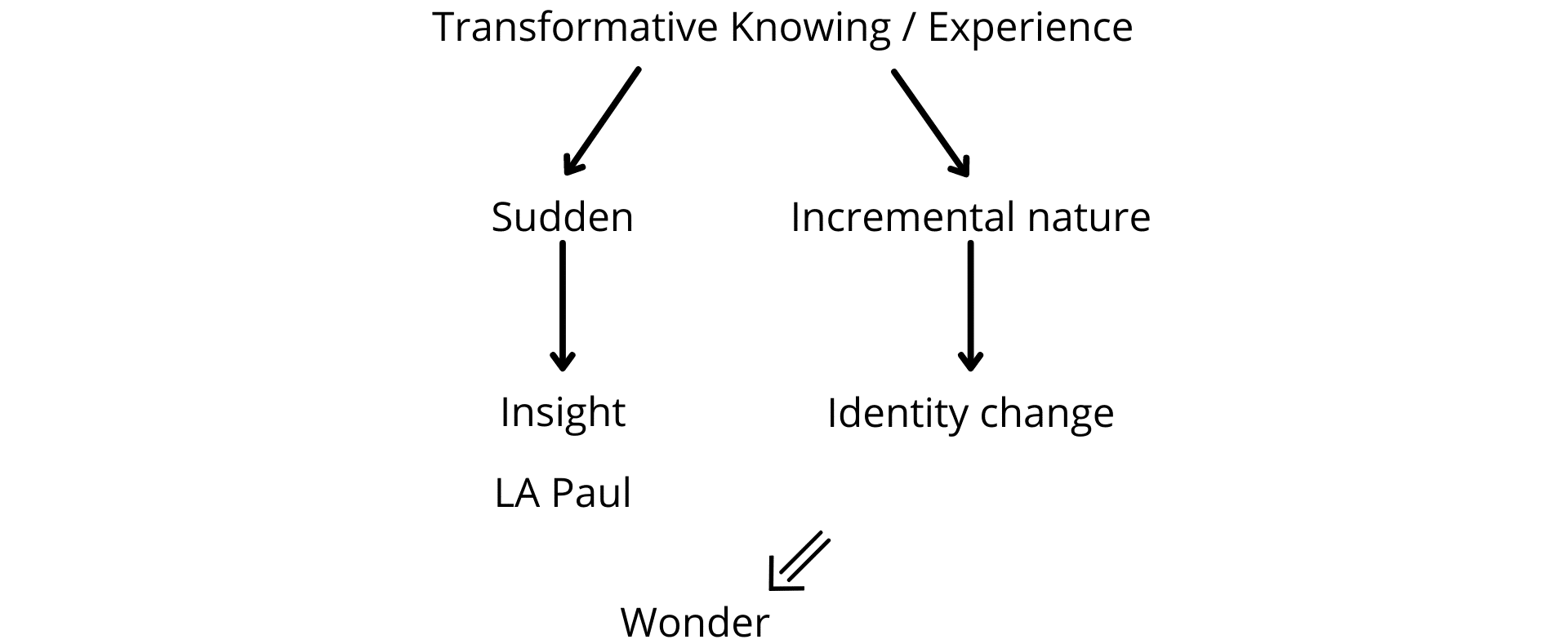
Fig. 7e
So. I think we can bring what was needed for a theory of wisdom, because, of course, Philosophia. We aspire to wisdom and we always aspire to wisdom because to claim—and this is a deep point—that we've achieved wisdom is kind of a mistake. So we need an account of understanding, an account of gnosis. And these are all related and an account of aspiration. We need them to be further explicated, integrated and then integrated with the accounts of wisdom that I've been arguing for already.
Okay. I want to try and draw this all together now. So I'll point to what's going on. Cause I'm going to need more time. I'm going to need time from the next episode to try and draw this all together. What I want to do in the drawing together is I want to try and draw this all together into an account of what wisdom is. I'll say what this is now so I don't just leave you completely hanging, but I want to come back and develop it. And then I want to try and connect this notion of wisdom back to enlightenment and back to responding, awakening from the meaning crisis.
An Account Of Wisdom
Here's the account of wisdom I'm going to leave you with. And then I'm going to come back and try and at least develop and defend a bit.
Wisdom is an ecology of psychotechnologies. An ecology of styles that dynamically—and that means reciprocally, in a reciprocal fashion—constrain and optimize each other, such that there is an overall optimization, enhancement of relevance realization. Relevance realization within inference, within insight and intuition, the connection to implicit processing, internalization, understanding, gnosis, transformation and aspiration. Wisdom is an ecology of psychotechnologies and cognitive styles that dynamically enhance relevance realization in inference, insight and intuition, internalization, understanding, and gnosis, transformation, and aspiration.
In that sense, what's happening is something that's already overlapping with the machinery of enlightenment. We're seeing that wisdom is a dynamical system. A dynamical system that is counteractive to the machinery of self-deception. And that helps to afford the self-organized transformation into the life of flourishing. A life that is deeply meaningful.
Thank you very much for your time and attention.
- END -
Episode 45 Notes
To keep this site running, we are an Amazon Associate where we earn from qualifying purchases
Leo Ferraro
Book Mentioned: The Scientific Study of Personal Wisdom: From Contemplative Traditions To Neuroscience – Buy Here
Sophrosyne
Sophrosyne is an ancient Greek concept of an ideal of excellence of character and soundness of mind, which when combined in one well-balanced individual leads to other qualities, such as temperance, moderation, prudence, purity, decorum, and self-control.
Enkratia
Enkrateia comes from the adjective which means possession, power over something or someone else.
Self-determination theory
Self-determination theory (SDT) is a macro theory of human motivation and personality that concerns people's inherent growth tendencies and innate psychological needs.
Book Mentioned: Scientific Understanding: Philosophical Perspectives – Buy Here
Book Mentioned: Understanding Scientific Understanding – Buy Here
Book Mentioned: Explaining Understanding: New Perspective From Epistemology And Philosophy Of Science – Buy Here
L. A. Paul
Laurie Ann Paul is a professor of philosophy and cognitive science at Yale University. She previously taught at the University of North Carolina at Chapel Hill and the University of Arizona. She is best known for her research on the counterfactual analysis of causation and the concept of “transformative experience.”
Agnes Callard
Agnes Callard is associate professor of philosophy at the University of Chicago. Her primary areas of specialization are ancient philosophy and ethics.
Book Mentioned: Aspiration: The Agency of Becoming – Buy Here
Other helpful resources about this episode:
Notes on Bevry
Additional Notes on Bevry


